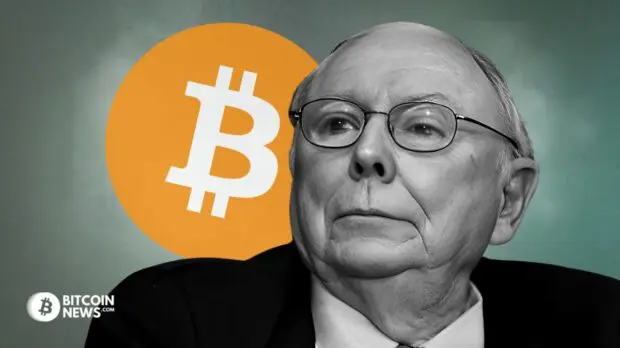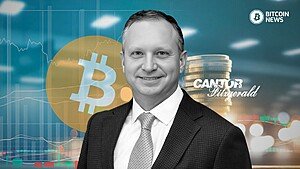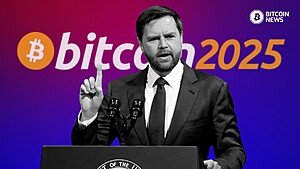The veteran vice chairman of Berkshire Hathaway recently had an interview with the Wall Street Journal, in which he talked about Bitcoin. Reviewing the latest Charlie Munger quotes reveals that he still maintains a negative view on the matter. Munger stated that he is worried about bitcoin price, calling it a “stink ball”. Munger gave some great insights on cognitive biases while completely ignoring his own bias when it comes to Bitcoin.
The man, renowned for his sharp wit and market wisdom alongside Warren Buffett, has once again expressed his disapproval of Bitcoin. Charlie likened Bitcoin to a “stink ball” in the otherwise long-standing, well-established global currency system.
His remarks were part of a revealing interview with the Wall Street Journal, where the 99-year-old elaborated on his concerns regarding the rising value of the world’s best digital asset. Munger has previously called Bitcoin “rat poison squared” and advocated for banning Bitcoin entirely.
Charlie Munger Quotes: Cognitive Biases in Investing
One of the more interesting quotes from Charlie’s Wall Street Journal interview touches on the psychological aspects of investing:
“There are lots of cognitive biases that are very significant. One is the constant tendency to overrate your own intelligence and skills in deciding what to do and what not to do.”
Charlie likely didn’t intend this advice to be applied to Bitcoin. But it applies. Don’t overestimate your Bitcoin abilities. A cautious approach is best. Avoid active trading or social media trends. Instead, deeply understand Bitcoin’s distinctness from both traditional assets and other digital assets. Charlie is certainly aware that some of the best portfolios are the ones of dead people who simply never sold their assets.
Evaluating Munger’s Perspective
While Munger’s immense success and experience warrants respect, his stance on Bitcoin reflects a narrow perspective rooted in the traditional fiat system he has thrived in for decades alongside Warren Buffett. Just as one would not ask their grandfather for IT assistance, seeking Bitcoin advice from the 99-year-old Munger is probably not a wise move.

The Clash of Economic Ideologies
Munger fundamentally believes in the necessity of a stable sovereign-backed currency, a view ingrained from long standing economic thinkers like Adam Smith. This clashes with the volatile (measured in fiat), decentralized nature of Bitcoin. Yet for a new generation of investors and technologists, Bitcoin’s detachment from government control offers liberating potential.
Innovation Versus Tradition
The Berkshire leader dubs Bitcoin “artificial,” intruding on a monetary system that has served humanity. Yet the U.S. dollar and all other fiat currencies are also “artificial”. Innovations like Bitcoin are creating entirely new paradigms in finance and technology that do not require artificial third parties. Bitcoin may be disruptive, but many see opportunities in its decentralization and permissionless accessibility.
Bitcoin Versus Global Debt
Munger’s reflections on cognitive bias lead to consideration of the broader financial context. The “stink ball” he refers to might not be Bitcoin but instead the massive global debt that exists. This debt is often exacerbated by the policies of governments who, as humans have a tendency to do, print money until it becomes worthless. Charlie’s advice to individuals about educating themselves and navigating away from stink-balls is wise.
Related reading: US $33 Trillion Debt Could Spark “Critical” Bitcoin Price Boom
Assessing Bitcoin’s Potential and Risks
While risks exist, Munger’s directive to avoid Bitcoin “as if an open sewer” seems misguided. A balanced perspective acknowledges Bitcoin’s uncertainties while recognizing its transformative possibilities. For many, Bitcoin offers an alternative to traditional systems they find untrustworthy. Their enthusiasm creates tangible value.
The Benefit of Diverse Opinions

Most reasonable minds can agree on Bitcoin’s merits. Categorically rejecting it as Munger does seems unproductive. His sentiments resonate with those fearing change, whereas many investors are open to exploring decentralized digital assets. Diversity of thought will likely benefit society more than stubbornly resisting innovation.
Munger’s accomplishments are remarkable. But progress often arises by respectfully challenging established paradigms. While his warnings offer valuable perspective, they may also reflect a narrow viewpoint shaped by past success. With open-mindedness and proper diligence, investors can thoughtfully balance risks and opportunities in this evolving landscape.










